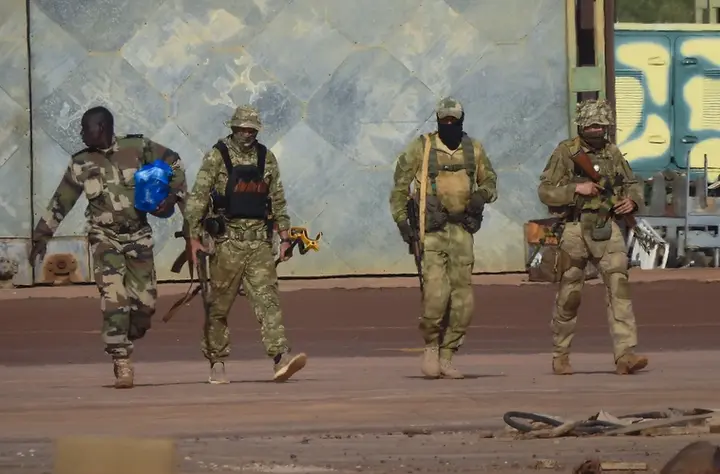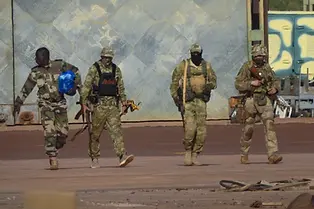
Members of the Africa Corps arrive in Bamako, Mali, following Wagner's withdrawal. [Getty Images]
As Russia’s Wagner Group withdraws from Mali, the African Corps takes over operations. What does this shift mean for Mali's security and human rights?
Published:
June 7, 2025 at 4:22:00 PM
Modified:
June 7, 2025 at 5:42:58 PM
In a move signaling a major recalibration of Russia’s security footprint in West Africa, the notorious Wagner Group has formally withdrawn from Mali, leaving behind a trail of controversy, casualties, and complex geopolitical implications.
Stepping into the vacuum is the newly minted Africa Corps, a paramilitary force under the direct supervision of the Russian Ministry of Defense. This transition marks the evolution of Russia’s strategy on the African continent, from shadow warfare to structured state-backed engagement.
Wagner’s deployment to Mali in late 2021 came at a time of acute political and security crises in the country. Following two successive military coups in 2020 and 2021, Mali’s ruling junta expelled French troops and distanced itself from international peacekeeping forces, notably the United Nations Multidimensional Integrated Stabilization Mission in Mali (MINUSMA).
In the resulting vacuum, Wagner presented itself as a willing partner, offering muscle against Islamist insurgents in exchange for access to mining concessions and strategic influence. For over three years, Wagner fighters supported the Malian Armed Forces (FAMa) in reclaiming territory from jihadist groups affiliated with al-Qaida and the Islamic State.
Russian officials and Malian authorities touted Wagner’s presence as a symbol of sovereignty and a rejection of “neo-colonial interference.” Yet, beneath the rhetoric lay a darker reality.
Wagner’s tenure was marked not only by counterinsurgency operations but also by severe allegations of human rights violations. Multiple investigations by the United Nations, Human Rights Watch, and local watchdogs have documented abuses ranging from mass executions to arbitrary detentions and sexual violence. The most infamous of these incidents was the March 2022 massacre in Moura, where hundreds of civilians were reportedly killed during a joint operation between Wagner operatives and Malian forces.
Despite these allegations, Wagner remained entrenched until now. According to a report by the Associated Press, the group has suffered significant losses in recent months, particularly from renewed offensives by jihadist factions. Analysts believe the attrition, coupled with internal changes in Russia following Yevgeny Prigozhin’s death and the group’s uncertain leadership structure, may have precipitated the withdrawal.
The void left by Wagner is not going unfilled. The Africa Corps, a new paramilitary unit under Russia’s Ministry of Defense, has officially assumed operational responsibilities in Mali. Unlike its predecessor, the Africa Corps is presented as a formal and structured entity, focused more on training, logistics, and intelligence sharing rather than front-line combat.
This transition reflects Moscow’s strategic pivot. By institutionalizing its military presence through state apparatus, Russia aims to normalize and legalize its security partnerships across Africa, distancing itself from the opaque and often rogue conduct associated with Wagner.
Mali’s Minister of Defense, Colonel Sadio Camara, welcomed the Africa Corps, praising the force as “disciplined, professional, and committed to long-term partnership.” Russian officials have also emphasized that the Africa Corps will uphold international laws and avoid the pitfalls that plagued Wagner’s operations.
Mali is not just another hotspot in the Sahel; it has become the geopolitical litmus test for new-age power competition in Africa. Once a pillar of French influence in the region, Mali’s decision to shift its allegiances eastward has altered the balance of power in West Africa.
Mali’s military junta is betting that Russian support, whether through Wagner or the Africa Corps, will succeed where French troops and UN peacekeepers failed: decisively defeating extremist insurgencies. Yet, critics warn that Mali’s overreliance on external forces, particularly those from authoritarian powers, may undermine long-term peacebuilding, democratic transition, and institutional reform.
Moreover, with the Africa Corps assuming a larger regional footprint, including potential operations in Burkina Faso, Niger, and the Central African Republic; Russia is entrenching itself as a major security actor on the continent. This expansion comes at a time when U.S. and European powers are recalibrating their military commitments in Africa, leaving a vacuum ripe for strategic competition.
The Wagner-Africa Corps transition raises broader questions about the role of private military contractors, the ethics of foreign security partnerships, and the future of sovereignty in post-colonial states grappling with persistent conflict.
At the regional level, it remains to be seen whether the Africa Corps can avoid the abuses and impunity that characterized Wagner’s operations. Transparency, oversight, and accountability will be critical if this new chapter is to mark a genuine improvement.
At the global level, Russia’s shift from informal mercenary influence to formalized state engagement may serve as a template for future operations in fragile states. It may also escalate tensions with Western powers already critical of Moscow’s military diplomacy in Africa.
As the dust settles over Wagner’s departure and the Africa Corps steps into the breach, Mali stands at yet another crossroads. Will this transition usher in a more stable and accountable security partnership? Or is it simply a rebranded continuation of a problematic status quo?
For Malians caught in the crossfire of geopolitical ambitions, the answer cannot come soon enough. What remains clear is that Mali continues to serve as a battleground—not just for territory and ideology, but for the future of Africa’s engagement with the world.
Keep Reading

